
Deutsch-Chinesische Enzyklopädie, 德汉百科
 Cyprus
Cyprus
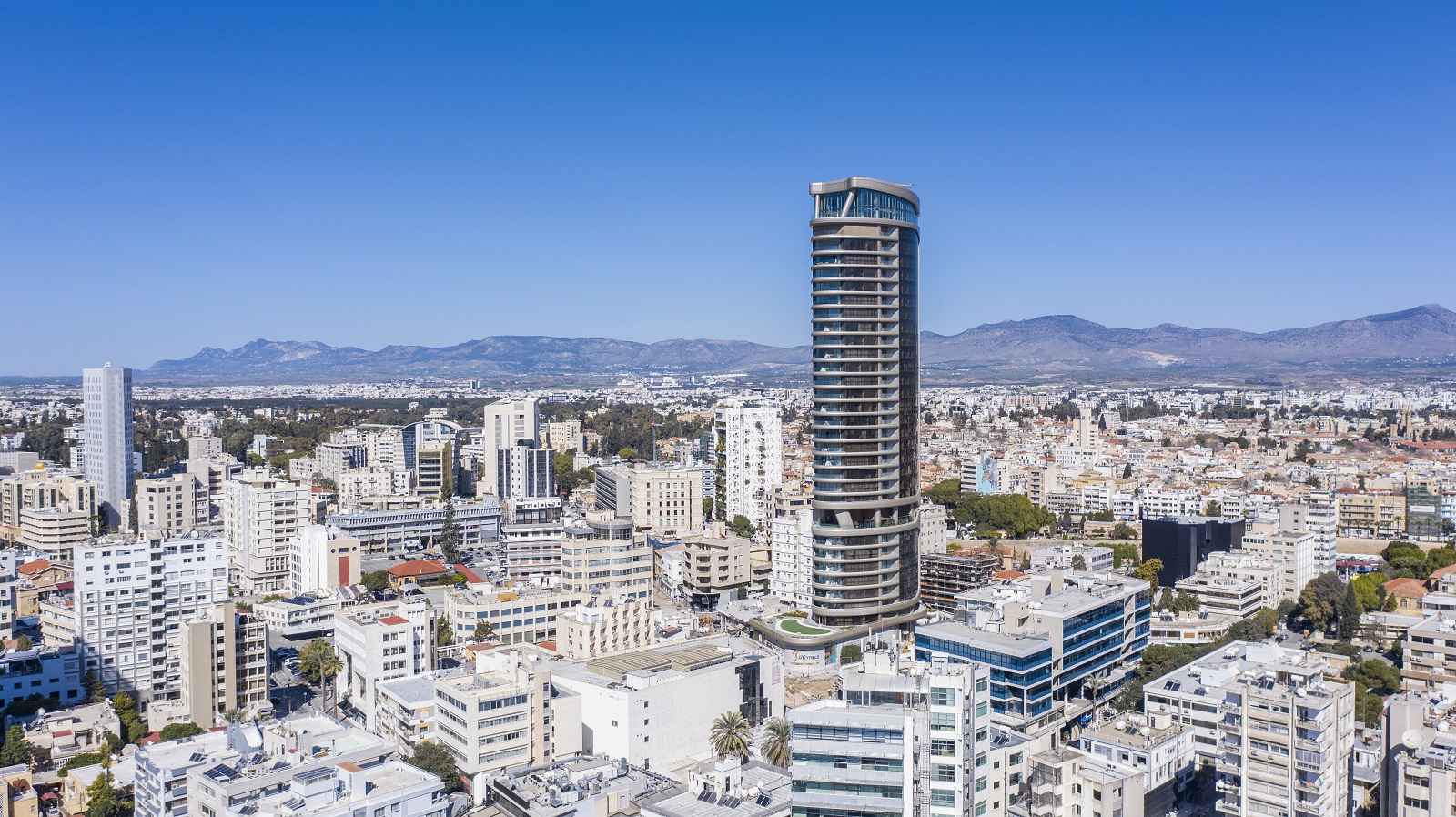
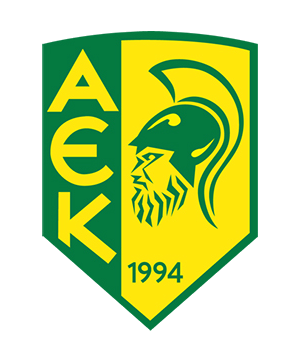

 Sport
Sport
 (F)UEFA Europa League
(F)UEFA Europa League
 UEFA Champions League 2017/18
UEFA Champions League 2017/18
 Group H
Group H
 UEFA Europa League 2019/20
UEFA Europa League 2019/20
 Group A
Group A
 Cyprus
Cyprus
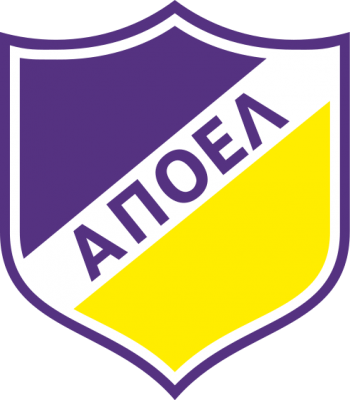
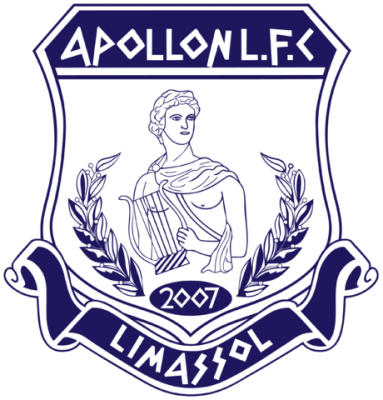
 Egypt
Egypt
 Algeria
Algeria
 Ethiopia
Ethiopia
 Bahrain
Bahrain

 Education and Research
Education and Research
 Djibouti
Djibouti
 Eritrea
Eritrea
 Gambia
Gambia

 Hand in Hand
Hand in Hand

 Hand in Hand
Hand in Hand
 Institute of Culture and Language
Institute of Culture and Language
 Iraq
Iraq
 Iran
Iran
 Israel
Israel
 Yemen
Yemen
 Jordan
Jordan
 Katar
Katar
 Comoros
Comoros
 Kuwait
Kuwait
 Libanon
Libanon
 Libya
Libya

 Literature
Literature
 Morocco
Morocco
 Mauritania
Mauritania
 Niger
Niger
 Nigeria
Nigeria
 Oman
Oman
 Palestine
Palestine
 Republic of the Sudan
Republic of the Sudan
 Republik Südsudan
Republik Südsudan
 Saudi Arabia
Saudi Arabia
 Senegal
Senegal
 Somalia
Somalia
 Syria
Syria
 Tansania
Tansania
 Tschad
Tschad
 Tunisia
Tunisia
 Turkey
Turkey
 United Arab Emirates
United Arab Emirates

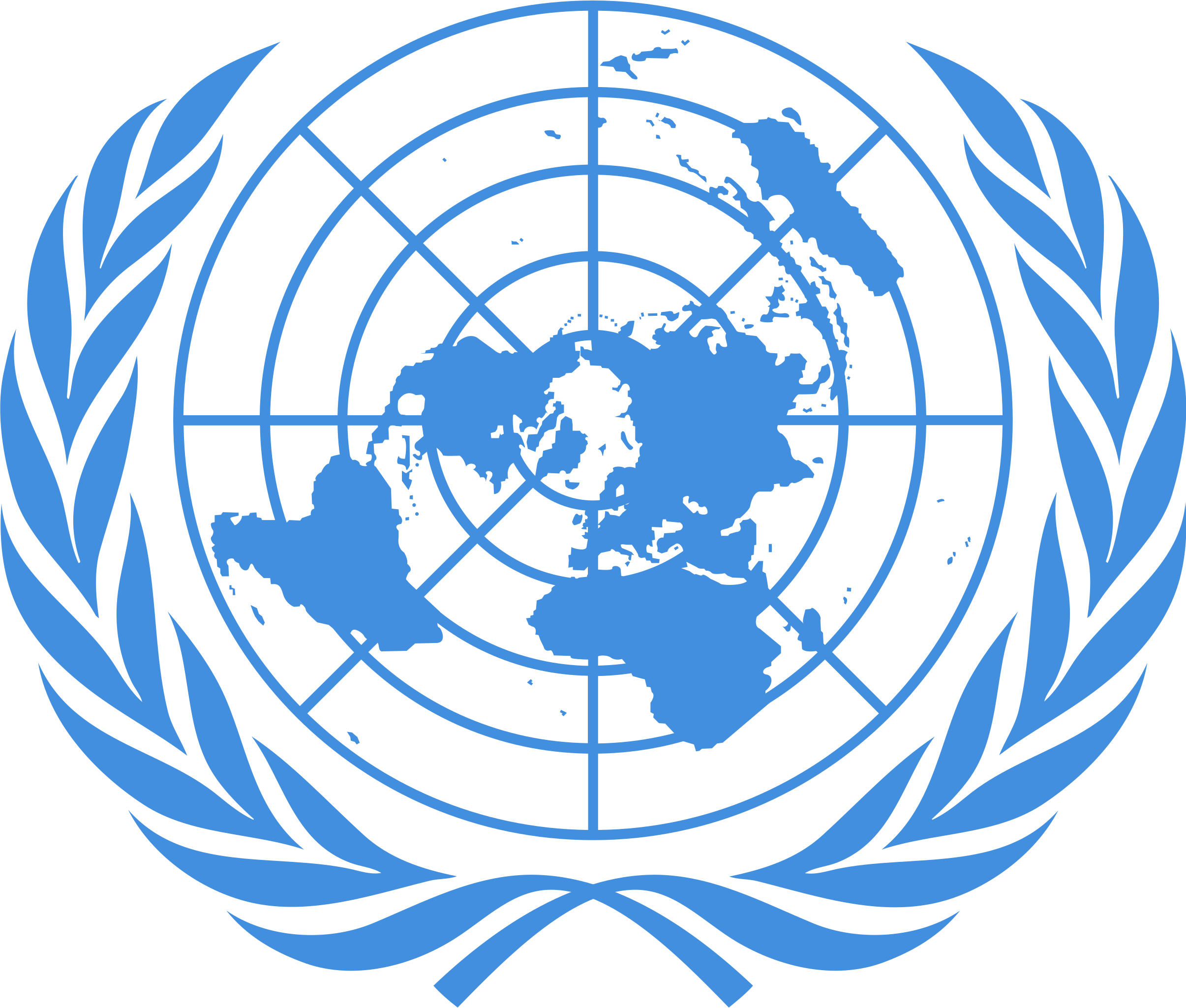 United Nations
United Nations
 Official languages
Official languages
 Cyprus
Cyprus
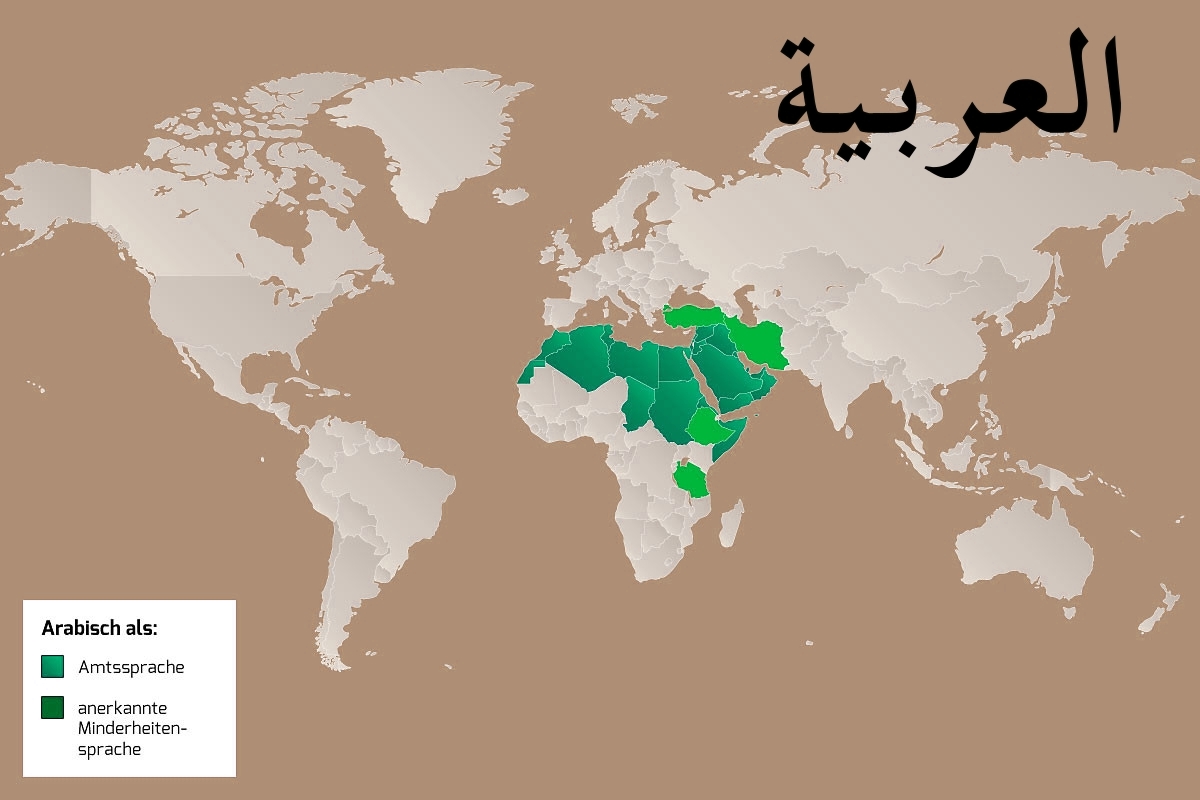
Die arabische Sprache (kurz Arabisch; Eigenbezeichnung اَللُّغَةُ اَلْعَرَبِيَّة, DMG al-luġatu l-ʿarabiyya ‚die arabische Sprache‘, kurz العربية, DMG al-ʿarabiyya ‚das Arabische‘, Ausspracheⓘ/?) ist die am weitesten verbreitete Sprache des semitischen Zweigs der afroasiatischen Sprachfamilie und in ihrer Hochsprachform الفصحى / al-Fuṣḥā eine der sechs Amtssprachen der Vereinten Nationen. Schätzungsweise wird Arabisch von 313 Millionen Menschen als Muttersprache und von weiteren 424 Millionen als Zweit- oder Fremdsprache gesprochen.[2][3] Auch durch seine Rolle als Sakralsprache entwickelte sich das Arabische zur Weltsprache.[4] Die moderne arabische Standardsprache beruht auf dem klassischen Arabischen, der Sprache des Korans und der Dichtung, und unterscheidet sich stark von den gesprochenen Varianten des Arabischen.
Aus dem klassischen Arabisch hat sich in den letzten anderthalb Jahrtausenden eine Vielzahl von Dialekten entwickelt. Für alle Sprecher dieser Sprache, außer den Sprechern des Maltesischen, ist Hocharabisch Schrift- und Dachsprache. Das Maltesische ist mit den maghrebinisch-arabischen Dialekten stark verwandt, wurde jedoch im Gegensatz zu den anderen gesprochenen Formen des Arabischen zu einer eigenständigen Standardsprache ausgebaut. Ob Hocharabisch als moderne Standardsprache zu betrachten ist, ist umstritten (siehe auch Ausbausprache). Es fehlt oft an einem einheitlichen Wortschatz für viele Begriffe der modernen Welt sowie am Fachwortschatz in vielen Bereichen moderner Wissenschaften. Darüber hinaus ist Hocharabisch innerhalb der einzelnen arabischen Länder relativ selten ein Mittel zur mündlichen Kommunikation.
Die einzelnen arabischen Dialekte in den verschiedenen Ländern unterscheiden sich teilweise sehr stark voneinander, wenn auch meist nur in der Aussprache, und sind bei vorliegender geographischer Distanz gegenseitig nicht oder nur schwer verständlich. So werden beispielsweise algerische Filme, die im dortigen Dialekt gedreht worden sind, zum Teil hocharabisch untertitelt, wenn sie in den Golfstaaten ausgestrahlt werden.
阿拉伯语(اَلْعَرَبِيَّةُ,al-ʿarabiyyah [al ʕaraˈbijːa] (ⓘ)或者 عربي/عربى,ʿarabīy [ˈʕarabiː] (ⓘ)或 [ʕaraˈbij]),书写形式也称阿拉伯文,是除了英语和法语之外最多国家使用的官方语言。阿拉伯语源自公元6世纪的古典阿拉伯语。它包括书面语及流通于中东、北非和非洲之角(即索马里半岛)的各种口语。阿拉伯语属于亚非语系。
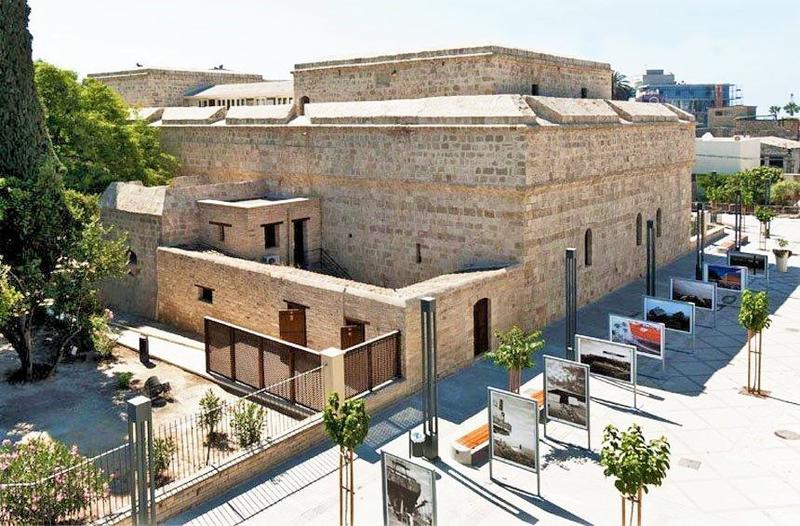

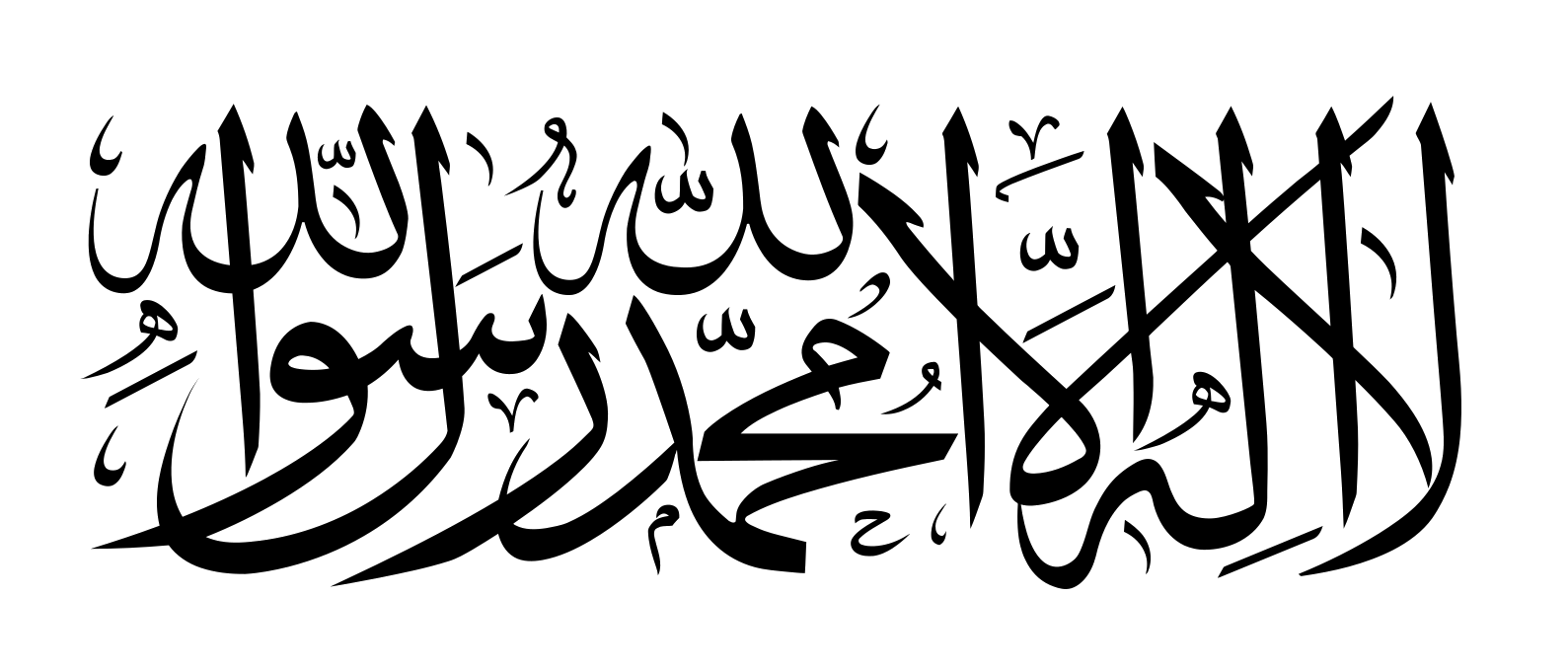 Afghanistan
Afghanistan
 Egypt
Egypt
 Armenia
Armenia
 Azerbaijan
Azerbaijan
 Ethiopia
Ethiopia
 Australia
Australia
 Bangladesh
Bangladesh
 Beijing Shi-BJ
Beijing Shi-BJ
 Brunei Darussalam
Brunei Darussalam
 China
China
 Denmark
Denmark
 Demokratische Republik Timor-Leste
Demokratische Republik Timor-Leste
 Germany
Germany
 Fidschi
Fidschi

 Financial
Financial
 International Bank for Cooperation
International Bank for Cooperation
 Finland
Finland
 France
France
 Georgia
Georgia
 Hongkong Tebiexingzhengqu-HK
Hongkong Tebiexingzhengqu-HK
 India
India
 Indonesia
Indonesia
 Iran
Iran
 Ireland
Ireland
 Iceland
Iceland
 Israel
Israel
 Italy
Italy
 Jordan
Jordan
 Cambodia
Cambodia
 Kasachstan
Kasachstan
 Katar
Katar
 Kyrgyzstan
Kyrgyzstan
 Laos
Laos
 Luxembourg
Luxembourg
 Malaysia
Malaysia
 Malediven
Malediven
 Malta
Malta

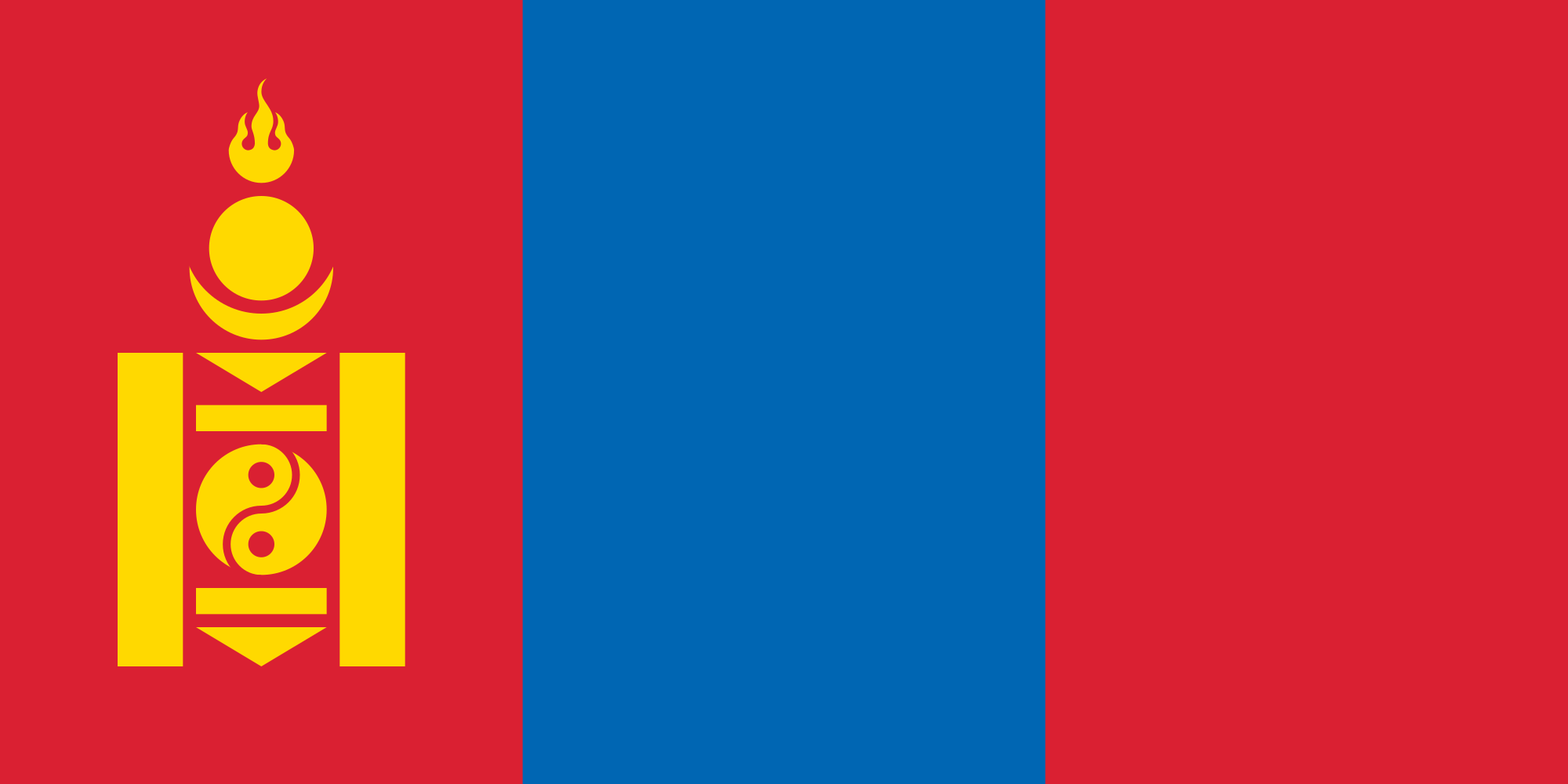 Mongolei
Mongolei
 Myanmar
Myanmar
 Nepal
Nepal
 New Zealand
New Zealand
 Netherlands
Netherlands
 Norwegen
Norwegen
 Oman
Oman
 Austria
Austria
 Pakistan
Pakistan
 Philippines
Philippines
 Poland
Poland
 Portugal
Portugal
 Republic of Korea
Republic of Korea
 Russia
Russia
 Samoa
Samoa
 Saudi Arabia
Saudi Arabia
 Sweden
Sweden
 Switzerland
Switzerland
 Singapore
Singapore
 Spain
Spain
 Sri Lanka
Sri Lanka
 South Africa
South Africa
 Tajikistan
Tajikistan
 Thailand
Thailand
 Turkey
Turkey
 Hungary
Hungary
 Uzbekistan
Uzbekistan
 United Arab Emirates
United Arab Emirates
 United Kingdom
United Kingdom
 Vietnam
Vietnam

 Important International Organizations
Important International Organizations

 Economy and trade
Economy and trade
 Economic and political research
Economic and political research
 Cyprus
Cyprus

亚洲基础设施投资银行(英语:Asian Infrastructure Investment Bank,縮寫:AIIB),简称亚投行,是一个愿意向亚洲国家和地區的基础设施建设提供资金支持的政府间性质的亚洲区域多边开发机构,成立的目的是促进亚洲区域的互联互通建设和经济一体化的进程,並且加大中國與其他亚洲國家和地区的合作力度。总部设在中国北京,法定资本为1,000亿美元。[2]
中华人民共和国主席习近平于2013年10月2日在雅加达同印度尼西亚总统苏西洛举行会谈时首次倡议筹建亚投行。[3]2014年10月24日,中国、印度、新加坡等21国在北京正式签署《筹建亚投行备忘录》。[2]2014年11月25日,印度尼西亚签署备忘录,成为亚投行第22个意向创始成员国。[4]
2015年3月12日,英国正式申请作为意向创始成员国加入亚投行,[5]成为正式申请加入亚投行的首个欧洲国家、主要西方国家。[6]随后法国、意大利、德国等西方国家纷纷以意向创始成员国身份申请加入亚投行。[7]接收新意向创始成员国申请截止日期3月31日临近,韩国[8]、俄罗斯[9]、巴西[10]等域内国家和重要新兴经济体也抓紧申请成为亚投行意向创始成员国。
各方商定将于2015年年中完成亚投行章程谈判并签署,年底前完成章程生效程序,正式成立亚投行。[11]
Die Asiatische Infrastrukturinvestmentbank (亞洲基礎設施投資銀行 / 亚洲基础设施投资银行, kurz: 亞投行 / 亚投行, englisch Asian Infrastructure Investment Bank, AIIB) ist eine multilaterale Entwicklungsbank, die 2014 von verschiedenen Staaten gegründet wurde und im Wettbewerb zur Weltbank, zum Internationalen Währungsfonds und zur Asiatischen Entwicklungsbank steht.
Anlass zur Initiative der Gründung war insbesondere die Unzufriedenheit Chinas über eine Dominanz der US-Amerikaner im Internationalen Währungsfonds, der keine faire Verteilung der globalen Machtverhältnisse aus Sicht Chinas widerspiegelte.[2] Da sich die US-Amerikaner strikt weigerten, eine Änderung der Stimmverhältnisse zu implementieren, begann China 2013 mit der Gründung der Initiative. Neben den 21 Gründungsmitgliedern haben im Jahr 2015 auch unter anderem Deutschland, Italien, Frankreich und das Vereinigte Königreich ihr Interesse bekundet, als nicht-regionale Mitglieder die neue Entwicklungsbank zu unterstützen.[3]
Die Gründungsurkunde der AIIB wurde am 29. Juni 2015 von Vertretern aus 57 Ländern in Peking unterzeichnet.[4] Die Bank nahm im Januar 2016 ihre Arbeit ohne Beteiligung der USA und Japan auf.[5]
Joachim von Amsberg ist der "Vizepräsident für Politik und Strategie".
アジアインフラ投資銀行(アジアインフラとうしぎんこう、英: Asian Infrastructure Investment Bank, AIIB、中: 亚洲基础设施投资银行,亞洲基礎設施投資銀行)は、国際開発金融機関のひとつである。
中華人民共和国が2013年秋に提唱し主導する形で発足した[1]。「合計の出資比率が50%以上となる10以上の国が国内手続きを終える」としていた設立協定が発効条件を満たし、2015年12月25日に発足し[2][3]、2016年1月16日に開業式典を行った[1][4]。
57か国を創設メンバーとして発足し[1][5]、2017年3月23日に加盟国は70カ国・地域となってアジア開発銀行の67カ国・地域を超え[6][7]、一方で日本、アメリカ合衆国などは2017年の現時点で参加を見送っている[8]。 創設時の資本金は1000億ドルである[9]。
The Asian Infrastructure Investment Bank (AIIB) is a multilateral development bank that aims to support the building of infrastructure in the Asia-Pacific region. The bank currently has 93 members from around the world [7]. The bank started operation after the agreement entered into force on 25 December 2015, after ratifications were received from 10 member states holding a total number of 50% of the initial subscriptions of the Authorized Capital Stock.[8]
The United Nations has addressed the launch of AIIB as having potential for "scaling up financing for sustainable development"[9] and to improve the global economic governance.[10] The starting capital of the bank was $100 billion, equivalent to 2⁄3 of the capital of the Asian Development Bank and about half that of the World Bank.[11]
The bank was proposed by China in 2013[12] and the initiative was launched at a ceremony in Beijing in October 2014.[13] It received the highest credit ratings from the three biggest rating agencies in the world, and is seen as a potential rival to the World Bank and IMF.[14][15]
La Banque asiatique d'investissement dans les infrastructures (BAII ou AIIB), est une banque d'investissement proposée par la République populaire de Chine dans le but de concurrencer le Fonds monétaire international, la Banque mondiale et la Banque asiatique de développement1 pour répondre au besoin croissant d'infrastructures en Asie du Sud-Est et en Asie centrale. Cette banque s'inscrit dans la stratégie de la nouvelle route de la soie, développée par la Chine.
La Banca Asiatica d'Investimento per le infrastrutture (AIIB), fondata a Pechino nell'ottobre 2014, è un'istituzione finanziaria internazionale proposta dalla Repubblica Popolare Cinese. Si contrappone al Fondo Monetario Internazionale, alla Banca Mondiale e all'Asian Development Bank[1], le quali si trovano sotto il controllo del capitale e delle scelte strategiche dei paesi sviluppati come gli Stati Uniti d'America.[2] Scopo della Banca è fornire e sviluppare progetti di infrastrutture nella regione Asia-Pacifico attraverso la promozione dello sviluppo economico-sociale della regione e contribuendo alla crescita mondiale.
El Banco Asiático de Inversión en Infraestructura (Asian Infrastructure Investment Bank o AIIB) es una institución financiera internacional propuesta por el gobierno de China. El propósito de este banco de desarrollo multilateral es proporcionar la financiación para proyectos de infraestructura en la región de Asia basado en un sistema financiero de préstamo1 y el fomento del sistema de libre mercado en los países asiáticos.
El AIIB está considerado por algunos como una versión continental del FMI y del Banco Mundial, y busca ser un rival por la influencia en la región del Banco de Desarrollo asiático (ADB), el cual esta alineado a los intereses de potencias, tanto regionales (Japón), como globales (Estados Unidos, la Unión Europea).2
El banco fue propuesto por Xi Jinping en 2013 e inaugurado con una ceremonia en Pekín en octubre de 2014. La ONU se a mostrado entusiasta con la propuesta china, a la que a descrito como el FMI del futuro y a señalado como "una gran propuesta para financiar el desarrollo sostenible" y "mejorar la gobernanza económica mundial". La entidad constó inicialmente con 100 mil millones de dolares, es decir, la mitad del dinero de que posee el Banco Mundial.
La entidad a recibido inversión por parte de corporaciones financieras estadounidenses como la Standard & Poor's, Moody's o Fitch Group34. Actualmente la entidad consta de 87 miembros, incluyendo los 57 miembros fundadores. Bélgica, Canadá, y Ucrania están barajando unirse al AIIB. Estados Unidos, Japón y Colombia no tienen intención de participar. China a prohibido a Corea del Norte unirse, instigando además una política de aislamiento contra esta por parte del AIIB.
Азиатский банк инфраструктурных инвестиций (АБИИ) (англ. Asian Infrastructure Investment Bank, AIIB) — международная финансовая организация, создание которой было предложено Китаем. Основные цели, которые преследует АБИИ, — стимулирование финансового сотрудничества в Азиатско-Тихоокеанском регионе, финансирование инфраструктурных проектов в Азии от строительства дорог и аэропортов до антенн связи и жилья экономкласса[1].
По заявлениям вице-премьера России Игоря Шувалова, AБИИ не рассматривается как потенциальный конкурент МВФ, Всемирного банка и Азиатского банка развития (АБР). Однако эксперты рассматривают AIIB как потенциального конкурента базирующихся в США Международного валютного фонда (МВФ) и Всемирного банка. После сообщений об успехах AIIB американский министр финансов США Джейкоб Лью предупредил, что международным финансовым организациям в США, таким как ВБ и МВФ, грозит потеря доверия [2][3].
Китай, Индия и Россия возглавили организацию, оказавшись в тройке крупнейших владельцев голосов. При этом на важнейшие решения КНР имеет фактическое право вето[4].
 *UK political system
*UK political system
 Antigua and Barbuda
Antigua and Barbuda
 Australia
Australia
 Bahamas
Bahamas
 Bangladesh
Bangladesh
 Barbados
Barbados
 Belize
Belize
 Botsuana
Botsuana
 Brunei Darussalam
Brunei Darussalam
 Commonwealth of Nations
Commonwealth of Nations
 Dominica
Dominica
 Ghana
Ghana
 Grenada
Grenada
 Guyana
Guyana
 India
India
 Jamaika
Jamaika
 Cameroon
Cameroon
 Canada
Canada
 Kenya
Kenya
 Kiribati
Kiribati
 Lesotho
Lesotho
 Malawi
Malawi
 Malaysia
Malaysia
 Malediven
Malediven
 Malta
Malta
 Mosambik
Mosambik
 Namibia
Namibia
 Nauru
Nauru
 New Zealand
New Zealand
 Nigeria
Nigeria
 Pakistan
Pakistan
 Papua-Neuguinea
Papua-Neuguinea
 Salomonen
Salomonen
 Sambia
Sambia
 Samoa
Samoa
 Seychellen
Seychellen
 Sierra Leone
Sierra Leone
 Singapore
Singapore
 Sri Lanka
Sri Lanka
 Saint Kitts and Nevis
Saint Kitts and Nevis
 St. Vincent and the Grenadines
St. Vincent and the Grenadines
 South Africa
South Africa
 Swasiland
Swasiland
 Tansania
Tansania
 Tonga
Tonga
 Trinidad und Tobago
Trinidad und Tobago
 Tuvalu
Tuvalu
 Uganda
Uganda
 Vanuatu
Vanuatu
 United Kingdom
United Kingdom

 Important International Organizations
Important International Organizations
 Cyprus
Cyprus
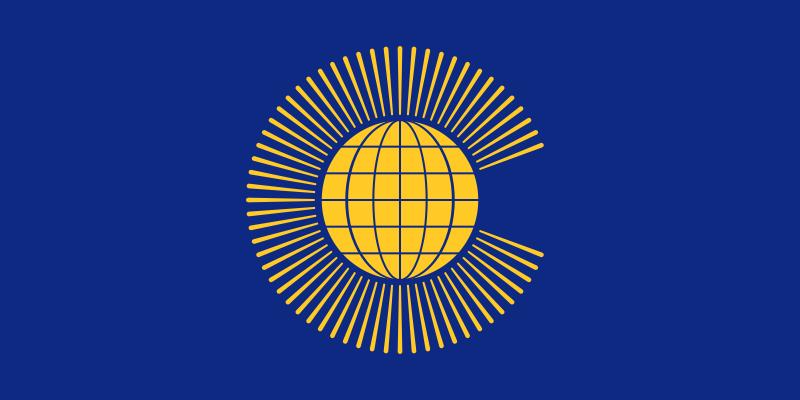
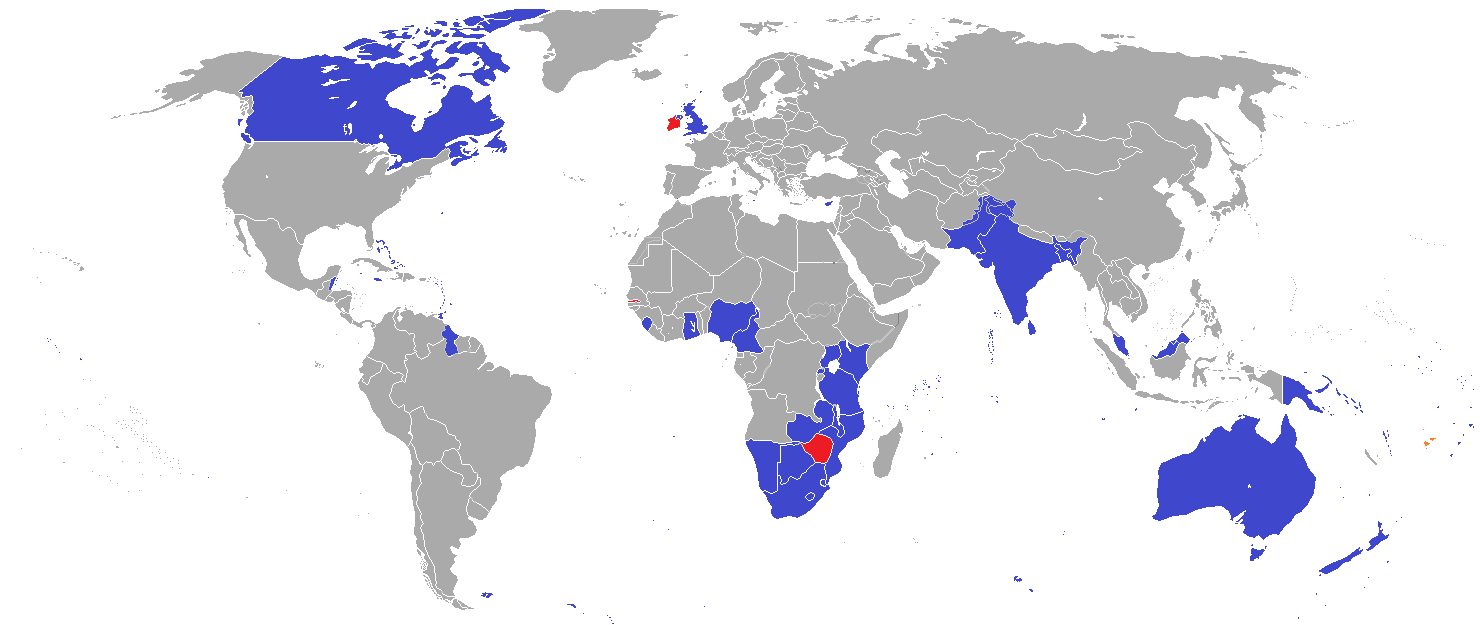
英联邦(英语:Commonwealth of Nations,新马作共和联邦,台湾作大英国协),是一个现代的国际组织,由56个英语系的主权国家联合而成。
英联邦不是一个统一的联邦国家,而是一个国际组织,英联邦也无权约束旗下任何成员国内政。英联邦元首通常由英国君主兼任,其首任元首是乔治六世,现任是查尔斯三世,但元首并无实权,秘书长才是英联邦实际上的掌权者[4][5]。该组织的成员国基本由英国及其旧殖民地组成,也以英式英语为共通语言,但英国的地位并没有凌驾于他国之上,所有成员国一律平等。目前英联邦有56个成员国,其中15个属于英联邦王国,英联邦王国的国家元首、英联邦元首均和英国的一致,即现在的查尔斯三世;另外5个属于独立君主国,它们不以英国君主为自己的元首,而是自立君主,这五国是文莱、斯威士兰、莱索托、马来西亚、汤加;其余的36个均属于共和国,没有君主。
The Commonwealth of Nations, generally known simply as the Commonwealth,[3] is a political association of 53 member states, nearly all of them former territories of the British Empire.[4] The chief institutions of the organisation are the Commonwealth Secretariat, which focuses on intergovernmental aspects, and the Commonwealth Foundation, which focuses on non-governmental relations between member states.[5]
The Commonwealth dates back to the first half of the 20th century with the decolonisation of the British Empire through increased self-governance of its territories. It was originally created as the British Commonwealth of Nations[6] through the Balfour Declaration at the 1926 Imperial Conference, and formalised by the United Kingdom through the Statute of Westminster in 1931. The current Commonwealth of Nations was formally constituted by the London Declaration in 1949, which modernised the community and established the member states as "free and equal".[7]
The human symbol of this free association is the Head of the Commonwealth, currently Queen Elizabeth II, and the 2018 Commonwealth Heads of Government Meeting appointed Charles, Prince of Wales to be her designated successor, although the position is not technically hereditary. The Queen is the head of state of 16 member states, known as the Commonwealth realms, while 32 other members are republics and five others have different monarchs.
Member states have no legal obligations to one another, but are connected through their use of the English language and historical ties. Their stated shared values of democracy, human rights and the rule of law are enshrined in the Commonwealth Charter[8] and promoted by the quadrennial Commonwealth Games.
The countries of the Commonwealth cover more than 29,958,050 km2 (11,566,870 sq mi), equivalent to 20% of the world's land area, and span all six inhabited continents.
Le Commonwealth ou Commonwealth of Nations (littéralement, la « Communauté des Nations ») est une organisation intergouvernementale composée de 53 États membres qui sont presque tous d'anciens territoires de l'Empire britannique.
Le Commonwealth a émergé au milieu du XXe siècle pendant le processus de décolonisation. Il est formellement constitué par la Déclaration de Londres de 1949 qui fait des États membres des partenaires « libres et égaux ». Le symbole de cette libre association est la reine Élisabeth II qui est chef du Commonwealth. La reine est également le chef d'État monarchique des 16 royaumes du Commonwealth. Les autres États membres sont 32 républiques et cinq monarchies dont le monarque est différent.
Les États membres n'ont aucune obligation les uns envers les autres. Ils sont réunis par la langue, l'histoire et la culture et des valeurs décrites dans la Charte du Commonwealth telles que la démocratie, les droits humains et l'état de droit.
Les États du Commonwealth couvrent 29 958 050 km2 de territoire sur les cinq continents habités. Sa population est estimée à 2,328 milliards d'habitants.
Il Commonwealth delle Nazioni o Commonwealth (acronimo CN) è un'organizzazione intergovernativa di 53 Stati membri indipendenti, tutti accomunati, eccetto il Mozambico e il Ruanda, da un passato storico di appartenenza all'Impero britannico, del quale il Commonwealth è una sorta di sviluppo su base volontaria. La popolazione complessiva degli stati che vi aderiscono è di oltre due miliardi di persone. La parola Commonwealth deriva dall'unione di common (comune) e wealth (benessere), cioè benessere comune.
In passato fu noto anche come Commonwealth britannico, benché tale definizione esistette formalmente solo dalla fondazione nel 1926 fino al 1948.
La Mancomunidad de Naciones (en inglés: Commonwealth of Nations)?, antiguamente Mancomunidad Británica de Naciones (British Commonwealth of Nations), es una organización compuesta por 53 países soberanos independientes y semi independientes que, con la excepción de Mozambique y Ruanda,1 comparten lazos históricos con el Reino Unido. Su principal objetivo es la cooperación internacional en el ámbito político y económico, y desde 1950 la pertenencia a ella no implica sumisión alguna a la Corona británica, aunque se respeta la figura de la reina del Reino Unido. Con el ingreso de Mozambique, la organización ha favorecido el término Mancomunidad de Naciones para subrayar su carácter internacionalista. Sin embargo, el adjetivo británico se sigue utilizando con frecuencia para diferenciarla de otras mancomunidades existentes a nivel internacional.
La reina Isabel II del Reino Unido es la cabeza de la organización, según los principios de la Mancomunidad, «símbolo de la libre asociación de sus miembros».
Содру́жество на́ций (англ. Commonwealth of Nations, до 1946 года — Британское Содружество наций — англ. British Commonwealth of Nations), кратко именуемое просто Содружество (англ. The Commonwealth) — добровольное объединение суверенных государств, в которое входят Великобритания и почти все её бывшие доминионы, колонии и протектораты. Членами Содружества также являются Мозамбик, Руанда, Намибия и Камерун[2].
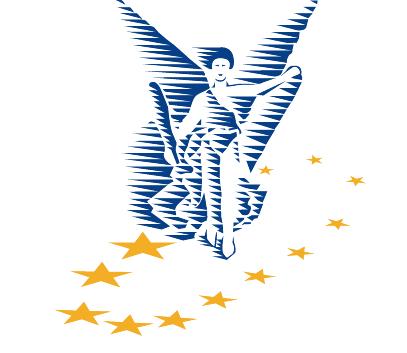
 Belgium
Belgium
 Bulgaria
Bulgaria
 Denmark
Denmark
 Germany
Germany
 Estonia
Estonia
 Finland
Finland
 France
France
 Greece
Greece
 Ireland
Ireland
 Iceland
Iceland
 Israel
Israel
 Italy
Italy
 Croatia
Croatia
 Latvia
Latvia
 Lithuania
Lithuania
 Luxembourg
Luxembourg
 Malta
Malta
 Monaco
Monaco
 Montenegro
Montenegro
 Netherlands
Netherlands
 Nordmazedonien
Nordmazedonien
 Norwegen
Norwegen
 Austria
Austria
 Poland
Poland
 Portugal
Portugal
 Romania
Romania
 Russia
Russia
 San Marino
San Marino
 Sweden
Sweden
 Switzerland
Switzerland
 Serbia
Serbia
 Slovakia
Slovakia
 Slovenia
Slovenia
 Spain
Spain
 Czech Republic
Czech Republic
 Turkey
Turkey
 Ukraine
Ukraine
 Hungary
Hungary
 United Kingdom
United Kingdom

 Science and technology
Science and technology
 Cyprus
Cyprus

 Belgium
Belgium
 Germany
Germany
 Estonia
Estonia


 Financial
Financial
 Currency
Currency

 Financial
Financial
 *Germany economic data
*Germany economic data

 Financial
Financial
 *European Union economic data
*European Union economic data

 Financial
Financial
 *France economic data
*France economic data

 Financial
Financial
 *Italy economic data
*Italy economic data

 Financial
Financial
 Special Drawing Right
Special Drawing Right

 Financial
Financial
 *Brazil economic data
*Brazil economic data

 Financial
Financial
 *China economic data
*China economic data

 Financial
Financial
 *Russia economic data
*Russia economic data

 Financial
Financial
 *Indonesia economic data
*Indonesia economic data

 Financial
Financial
 *India economic data
*India economic data
 Finland
Finland
 France
France
 Greece
Greece
 Hartwährung/Strong Currency
Hartwährung/Strong Currency
 Ireland
Ireland
 Italy
Italy
 Latvia
Latvia
 Luxembourg
Luxembourg
 Malta
Malta
 Netherlands
Netherlands
 Austria
Austria
 Portugal
Portugal
 Slovakia
Slovakia
 Slovenia
Slovenia
 Spain
Spain
 Cyprus
Cyprus

 Albania
Albania
 Andorra
Andorra
 Armenia
Armenia
 Azerbaijan
Azerbaijan
 Belgium
Belgium
 Bosnia Herzegovina
Bosnia Herzegovina
 Bulgaria
Bulgaria
 Denmark
Denmark
 Germany
Germany
 Estonia
Estonia

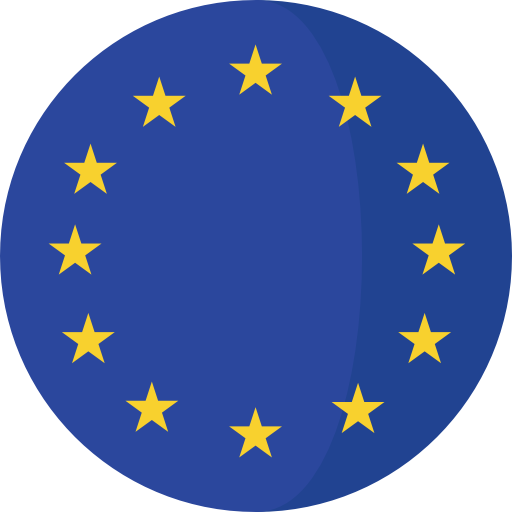 European Union
European Union
 Finland
Finland
 France
France
 Georgia
Georgia
 Greece
Greece
 Ireland
Ireland
 Iceland
Iceland
 Italy
Italy
 Kosovo
Kosovo
 Croatia
Croatia
 Latvia
Latvia
 Liechtenstein
Liechtenstein
 Lithuania
Lithuania
 Luxembourg
Luxembourg
 Malta
Malta
 Moldawien
Moldawien
 Monaco
Monaco
 Montenegro
Montenegro
 Netherlands
Netherlands
 Nordmazedonien
Nordmazedonien
 Norwegen
Norwegen
 Austria
Austria

 Party and government
Party and government

 Party and government
Party and government
 European Political Community Summit
European Political Community Summit
 Poland
Poland
 Portugal
Portugal
 Romania
Romania
 San Marino
San Marino
 Sweden
Sweden
 Switzerland
Switzerland
 Serbia
Serbia
 Slovakia
Slovakia
 Slovenia
Slovenia
 Spain
Spain
 Czech Republic
Czech Republic
 Turkey
Turkey
 Ukraine
Ukraine
 Hungary
Hungary
 United Kingdom
United Kingdom
 Cyprus
Cyprus

欧洲政治共同体(英語:European Political Community,简称:EPC),是成立于2022年的欧洲政治和战略讨论平台。该集团于2022年10月在捷克布拉格举行首届会议,欧盟所有27个成员国及17个非欧盟国家首脑与会。
Die Europäische Politische Gemeinschaft (EPG)[1] (französisch Communauté politique européenne, CPE; englisch European Political Community, EPC) ist eine europäische, zwischenstaatliche Organisation aus 47 europäischen und vorderasiatischen Staaten, die in den Bereichen Politik, Sicherheit, Energie, Verkehr, Investitionen, Infrastruktur und Personenverkehr zusammenarbeiten. Sie ist eine eigene Institution, welche weder mit der Europäischen Union (die zu den Teilnehmern der EPG gehört) noch mit dem Europarat zusammenhängt. Das EPG-Gründungstreffen fand am 6. Oktober 2022 in der tschechischen Hauptstadt Prag statt.
Im Rahmen der EPG sollen die EU-Beitrittskandidaten, die EFTA-Mitgliedstaaten sowie das Vereinigte Königreich als ehemaliges EU-Mitglied enger an die Europäische Union gebunden und ihnen so eine Möglichkeit der Mitarbeit in deren Politikfeldern gegeben werden, ohne Vollmitglied sein zu müssen. Daher wurde dieses Format auch bereits als eine Art „assoziierte EU-Mitgliedschaft“ beschrieben. Als Hintergrund ist auch zu sehen, dass die derzeitigen Beitrittskandidaten größtenteils als noch nicht beitrittsfähig angesehen werden, man ihrem Wunsch der engeren Kooperation aber (zunächst) auf diese Weise entsprechen will bzw. andere Teilnehmerstaaten derzeit nicht EU-Mitglied werden wollen. Fast alle Teilnehmer sind gleichzeitig auch Mitglied des Europarats.
Während der Vorschlag der Europäischen Politischen Gemeinschaft von 1952 ein Versuch war, eine umfassende politische Integration europäischer Staaten zu verwirklichen, und an dieser nur die sechs damaligen Mitglieder der Europäischen Gemeinschaft für Kohle und Stahl (EGKS oder auch „Montanunion“) teilnehmen sollten, hat die neue, 70 Jahre später vorgeschlagene, Gemeinschaft einen lockereren, intergouvernmentalen Ansatz.
 Architecture
Architecture
 Geography
Geography